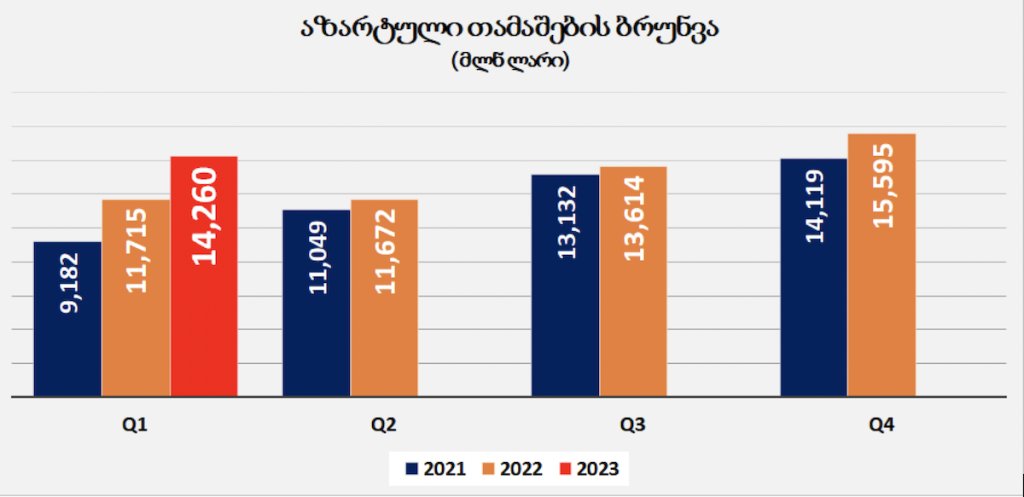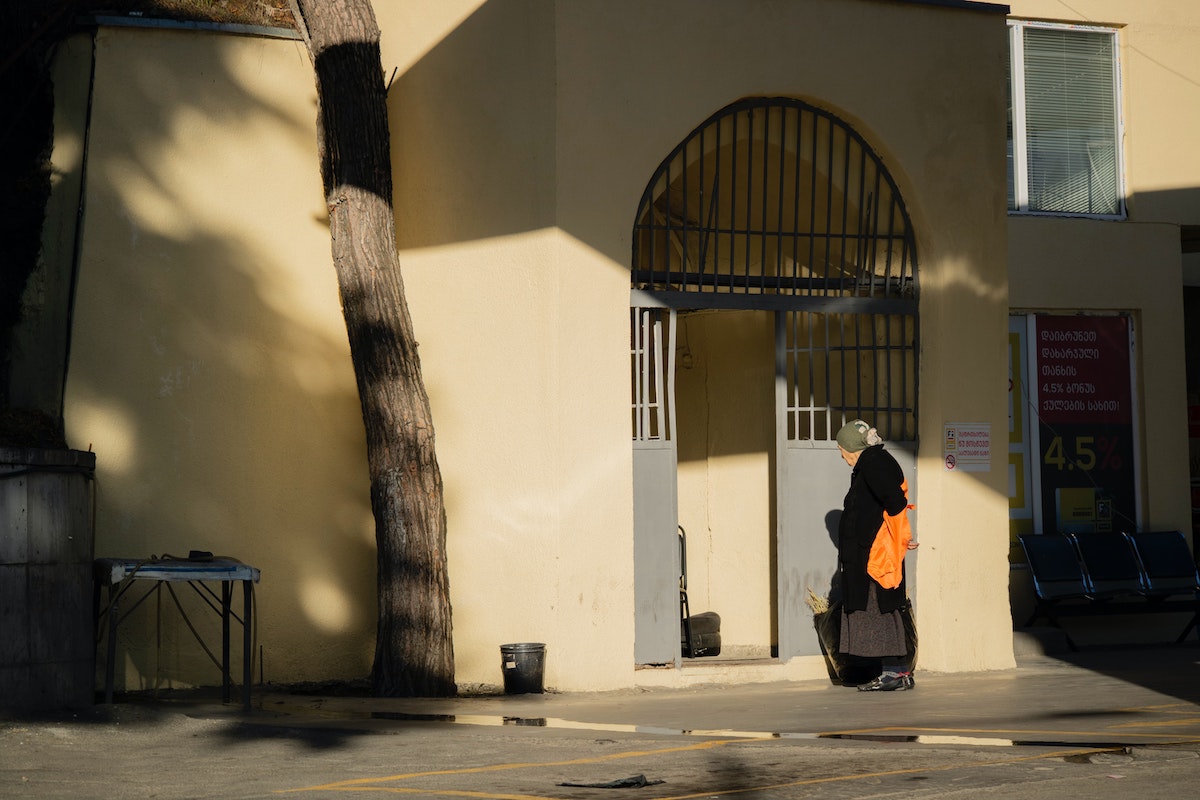Ban on gambling advertising in Georgia: media revenues declines, while gaming industry grows
Advertising of gambling in Georgia
It has been over a year since the advertisement of gambling was banned in Georgia. This regulation, which came into effect in March 2022, was intended, according to the government’s clarification, to reduce citizens’ dependency on gambling and protect the youth from this harmful habit.
However, the numbers show that this outcome has not been fully achieved. Analyst Giorgi Elizbarashvili summarizes the legislative changes related to gambling.
___________________________
Doubts about whether the goal of the decision was actually to reduce media revenue sources arose from the very beginning. Later, official statistics confirmed this – in 2022, compared to 2021, the turnover of the gambling business increased by four billion five hundred and nine million lari [about $1.7 billion] to fifty-two billion five hundred and ninety-six million lari [about $20 billion].
Gambling addiction is indeed a significant problem in Georgia. Despite the lack of reliable research, most people can easily recall someone they know who sold their house, fled the country, or worse, ended their own life due to gambling.
The substantial economic benefits brought by the gaming industry (more than 11,000 jobs and over 500 million lari [about $190 million] paid annually to the budget) cannot outweigh the harm inflicted on players and their families.
At first glance, a complete prohibition of the gaming industry may seem like the best solution, but it won’t solve the problem and would resemble a war on drugs – pushing activities underground and increasing the number of criminal cases. Moreover, in the modern global world, users can bypass the law and engage in online gambling through platforms registered abroad.
Regulation is a kind of middle ground. This is where questions arise. Should a 15-year-old student be allowed into a casino, while an 18-year-old citizen, who has the right to vote in elections and therefore the right to participate in determining the country’s political course, be allowed to gamble? And what if they’re 21 years old? In the recent past, one could become a member of parliament at 21 years old. Before the law was tightened, the minimum age limit for casinos was 21. According to the new rules, the minimum age limit has been raised to 25.
The law has been tightened in several areas, including:
- The minimum age limit has been increased from 21 to 25 years;
- Socially vulnerable citizens and government officials are prohibited from gambling;
- Individuals are given the option to voluntarily enroll themselves in a special registry for self-exclusion;
- Registration on online casinos registered abroad is prohibited;
- Transfers from one account to another are prohibited;
- Fees have increased;
- Commission for withdrawing money from an account has increased;
- Advertising of gambling is prohibited.
The advertising industry’s turnover worldwide exceeds $600 billion. Whether it’s a small business or a multinational corporation, they have to allocate a significant portion of their income to advertising. The goal is simple – to increase sales to a point where the additional revenue outweighs the advertising costs.
Monopolies also use advertising, but not as aggressively. Advertising is often done to showcase an advantage over competitors. A car owner will continue to fill up their car with the same gasoline even without any advertising. However, advertising can influence them in such a way that they might switch gas stations.
When television cigarette commercials were banned in the United States in the 1970s, people were surprised that the tobacco industry giants didn’t put up much resistance. In reality, they suffered less financially. Yes, sales decreased slightly, but so did their expenses. If someone had decided to stop advertising voluntarily before the law changed, they would have lost. But when advertising was banned for everyone, the rules of the game were distributed more evenly.
There are several reasons to believe that the actual reason behind the ban on gambling advertising could have been a campaign against the media rather than addressing gambling addiction. In May 2013, the parliament rejected a law in the second reading that had already been approved in the first reading. Even back then, Deputy Koba Davitashvili’s bill included a ban on advertising gambling but not casinos as a whole. Members of the majority at the time justified their decision by stating that the law “damages the advertising business.” Koba Davitashvili also criticized former Prime Minister Bidzina Ivanishvili, noting that his initiative harms the investment environment.
Since 2017, MP Levan Gogichaishvili has been advocating the regulation of gambling, the ban on advertising, and the blocking of socially vulnerable individuals and government officials, which is essentially what came into effect in 2022. However, in 2019, the parliament rejected this initiative as well.
The history of the gambling addiction problem is long and did not start in 2022. If the ban on advertising was a panacea, why was it abandoned in 2013 and 2019? If the ban was causing damage to the advertising business and the investment environment, why did the parliament eventually agree to such a decision? What led to this change in priorities?
There is no exact answer to these questions, but the ongoing processes in the country allow for certain logical conclusions to be drawn. In 2013, the “Georgian Dream” was a newcomer to power, enjoying popularity and acknowledging democratic principles. The weak opposition and critical media did not pose threats to the ruling party.
In May 2019, in a deteriorating media environment, the decision of the European Court of Human Rights regarding the then-opposition television company “Rustavi-2” was not yet known. After a change in ownership, new critical media outlets such as “Mtavari Arkhi” and “Formula” were created. Despite purported requests, the TV channel “Pirveli” did not change its editorial policy in favor of the government. Despite achieving a victory in the European Court in a specific case, control over critical media outlets could not be established, and a decision was made to restrict access to financial resources in order to achieve the desired goal.
During the consideration of the draft law, one of the leaders of the opposition party “Lelo” proposed exempting the media from taxes for three years to compensate for the expected revenue decrease. His proposal was not taken into account even partially, and the tax burden on the media was neither lifted nor eased, albeit temporarily.
At the same time, financial pressure is only a part of the influence.
In the context of the fight against critical media, the cases of judicial persecution against their leaders also raise questions. In May 2022, two months after the ban on gambling advertising, the founder and CEO of the television company “Mtavari,” Nika Gvaramia, was arrested on ridiculous charges. He spent 13 months in prison and was released in June 2023 by a presidential pardon from Salome Zurabishvili, the President of Georgia. In September 2021, the Supreme Court overturned the decisions of two lower courts and found the founder of the “Formula” television company, David Kezerashvili, guilty. In March 2022, he was ordered to pay five million euros to the Ministry of Defense. A year later, the appellate court upheld the decision of the city court. It is impossible to convincingly prove anything, but the timing of the advertising ban and the judicial persecution of media managers only intensify these suspicions.
In 2021, television channels generated 80 million lari [approximately $30.5 million] in advertising revenue, including over 22 percent from gambling advertising, which amounted to 17.9 million lari [approximately $6.8 million]. A 22 percent decline in revenue is a significant blow to any industry, especially for the media, which in Georgia only generate profits in exceptional cases. Their existence largely depends on external financing, whether it’s from the government, owners, or international donors.
The Communications Commission publishes information on television and radio. Television advertising is the most expensive, although the percentage of profit from gambling advertising in the overall online agency advertising was even higher, depending on the specifics.
The reduction in access to financial resources also created a problem for timely payment of salaries to media employees in 2022.
What results have the regulations brought? According to the National Statistics Service of Georgia, in 2021, the turnover of gambling (the total amount wagered) reached 48.086 billion lari [approximately $18.3 billion], accounting for 32 percent of the total economy (150.415 billion lari [approximately $57 billion]). In 2022, the overall economy turnover increased to 179.477 billion lari [approximately $68 billion], with gambling reaching 52.596 billion lari [approximately $20 billion]. Due to relatively low growth rates, its share in the total turnover decreased to 29.3 percent. Can this decrease be considered a success? To a lesser extent, as the share initially decreased only slightly and temporarily. Such statistics are highly interesting. In the first quarter, when the restrictions were in place only in March, this share stood at 30.4 percent, in the second quarter, it decreased to 28 percent, in the third quarter, it increased to 28.6 percent, and in the fourth quarter, it rose to 30.2 percent.

As for the first quarter of 2023, the share of turnover in the gambling industry reached 32.3 percent, exceeding not only the 2022 figure but also that of 2021.
In comparison to the first quarter of 2021, the overall business turnover in the first quarter of 2023 increased by 53 percent, and gambling turnover rose by 55 percent.
Official data also confirm that the impact of stringent prohibitive rules was minor and temporary. The statistics do not indicate the extent to which the industry went underground and the norms that were circumvented, mainly through the use of cryptocurrency in online casinos abroad. There is also a lack of reliable research on this matter. Although the growth rate of gambling turnover has slightly decreased, it is unclear what caused it, as rules were tightened in other areas alongside advertising.
It can be assumed that the turnover increased while the number of players decreased, and the growth occurred through higher bets. This is partly true, but it is also true that some individuals who were prohibited from playing started using other people’s accounts.
Another issue lies in law enforcement. The visibility of advertisements for Georgian citizens has decreased only partially. There is no longer any advertising on television or Georgian websites, but it is still present on YouTube, including when viewing Georgian-language content.

In the end, it can be said that the stated goal was not achieved. On the contrary, the industry’s turnover has increased. In fact, the financial blow fell on the media rather than any casino network.




















